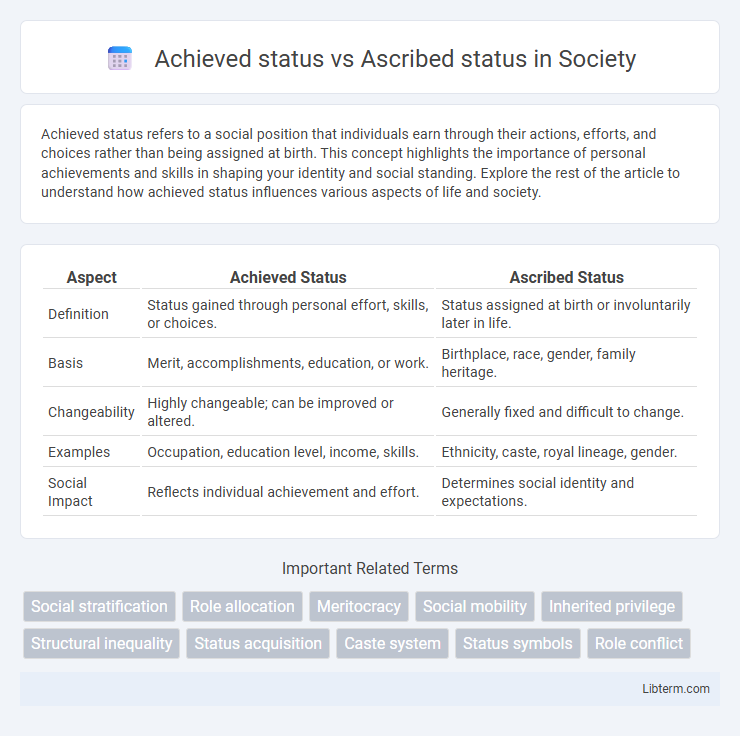Achieved status refers to a social position that individuals earn through their actions, efforts, and choices rather than being assigned at birth. This concept highlights the importance of personal achievements and skills in shaping your identity and social standing. Explore the rest of the article to understand how achieved status influences various aspects of life and society.
Table of Comparison
| Aspect | Achieved Status | Ascribed Status |
|---|---|---|
| Definition | Status gained through personal effort, skills, or choices. | Status assigned at birth or involuntarily later in life. |
| Basis | Merit, accomplishments, education, or work. | Birthplace, race, gender, family heritage. |
| Changeability | Highly changeable; can be improved or altered. | Generally fixed and difficult to change. |
| Examples | Occupation, education level, income, skills. | Ethnicity, caste, royal lineage, gender. |
| Social Impact | Reflects individual achievement and effort. | Determines social identity and expectations. |
Introduction to Social Status
Social status in sociology differentiates into achieved status, earned through personal efforts, and ascribed status, assigned at birth based on attributes like ethnicity or gender. Achieved status reflects individual accomplishments, such as career success, while ascribed status often dictates social expectations and opportunities without personal choice. Understanding this distinction highlights how social position shapes identity and interaction within society.
Defining Achieved Status
Achieved status refers to a social position or rank that an individual attains through personal effort, skills, or accomplishments rather than being born into it. It reflects meritocratic factors such as education, career success, or talents that contribute to social mobility. This status contrasts sharply with ascribed status, which is assigned at birth based on characteristics like race, gender, or family background.
Understanding Ascribed Status
Ascribed status refers to the social position assigned to individuals based on inherent traits such as race, gender, ethnicity, or family background, which are typically fixed and beyond personal control. This status shapes opportunities and social interactions from birth, influencing one's identity and societal expectations without consideration of individual achievements. Understanding ascribed status is crucial in analyzing social stratification and systemic inequality within various cultural contexts.
Key Differences Between Achieved and Ascribed Status
Achieved status is acquired through personal effort, skills, and actions, reflecting individual accomplishments such as a career position or educational attainment. Ascribed status is assigned at birth or involuntarily, based on attributes like ethnicity, gender, or family heritage, over which individuals have little control. The key difference lies in the source of status: achieved status is earned, while ascribed status is inherited or imposed by society.
Examples of Achieved Status in Society
Achieved status refers to positions or roles in society that individuals earn or accomplish through their efforts, skills, or choices, such as becoming a doctor, athlete, or entrepreneur. Examples include a university graduate who secures a managerial job, an artist who gains fame through talent and dedication, or a politician elected by popular vote. These statuses highlight personal achievement and social mobility, contrasting with ascribed status, which is assigned at birth or involuntarily, like race or family heritage.
Examples of Ascribed Status in Society
Examples of ascribed status in society include race, ethnicity, gender, and family heritage, which individuals inherit at birth without personal choice. Social roles such as royalty or caste are also typical ascribed statuses that influence one's social identity and opportunities. These statuses are contrasted with achieved statuses, which are acquired through personal effort, education, or accomplishments.
Impact of Status on Social Mobility
Achieved status, earned through individual effort and accomplishments, enhances social mobility by allowing people to change their social position based on merit, skills, and achievements. In contrast, ascribed status, determined by birth or inherited characteristics such as race, ethnicity, or family background, often restricts social mobility by imposing fixed social roles and limiting access to opportunities. The interaction between achieved and ascribed statuses significantly shapes individuals' ability to move within social hierarchies, influencing patterns of inequality and access to resources.
Role of Culture in Social Status Assignment
Achieved status is determined by individual actions, skills, or accomplishments within a society, while ascribed status is assigned based on inherited traits such as ethnicity, gender, or family background. Culture shapes the importance and criteria of both statuses by influencing social norms, values, and expectations that dictate how status is recognized and maintained. In collectivist cultures, ascribed status often holds greater significance, whereas individualistic cultures emphasize achieved status in social hierarchy formation.
Implications for Social Inequality
Achieved status, earned through individual effort and merit, often allows for social mobility but can reinforce inequalities when access to opportunities is uneven. Ascribed status, determined by birth traits like race, gender, or family background, typically entrenches social stratification by limiting individuals' ability to change their social position. The interplay between achieved and ascribed statuses shapes persistent social inequalities, influencing access to resources, education, and power.
Conclusion: Interplay Between Achieved and Ascribed Status
The interplay between achieved and ascribed status shapes individual identity and social mobility by combining personal efforts with inherited social positions. Achieved status allows individuals to influence their social standing through education, occupation, and accomplishments, while ascribed status reflects characteristics assigned at birth, such as race, gender, and family background. Together, these statuses create a dynamic framework that determines opportunities, influences social interactions, and affects inequality within societal structures.
Achieved status Infographic

 libterm.com
libterm.com